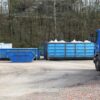Food Waste Data Analysis in Florida –
Food waste is a significant concern, especially in commercial operations like restaurants, hotels, and catering businesses in Miami, Florida. The city’s diverse culinary landscape emphasizes the need for effective food waste management strategies. An emerging and potent tool in this endeavor is data analytics. As a responsible roll-off dumpster rental company named Ready2Go Dumpsters based in Florida, we recognize the potential of leveraging data analytics to reduce food waste in commercial operations. In this article, we delve into the power of data analysis in addressing this critical issue.
The Role of Data Analysis in Food Waste Reduction
1. Identifying Waste Patterns:
Data analysis allows for a granular examination of waste patterns in commercial establishments. This insight helps in understanding when and where food waste occurs most frequently.
2. Quantifying Waste Generation:
Through data analysis, the volume and types of food waste generated can be accurately measured. This quantification provides a solid foundation for targeted waste reduction strategies.
3. Determining Causes of Waste:
Data analysis helps pinpoint the root causes of food waste, whether it’s overproduction, improper storage, or spoilage. Identifying these causes is vital for implementing effective solutions.
Implementing Food Waste Data Analysis
1. Data Collection and Tracking:
Commercial establishments need to collect comprehensive data on food waste. This includes the type of waste, quantity, time of waste generation, and reasons for disposal.
2. Data Storage and Organization:
Efficient organization and storage of data are critical. Establish a structured system to categorize and store the data for easy retrieval and analysis.
3. Data Analytics Tools:
Utilize specialized data analytics tools to process and analyze the collected data. These tools help in identifying trends, patterns, and correlations that can be leveraged to optimize waste reduction strategies.
4. Collaboration and Training:
Encourage collaboration between data analysts, waste management teams, and sustainability experts. Training staff in data analytics can also enhance the collective understanding and application of insights.
Benefits of Food Waste Data Analysis
1. Informed Decision Making:
Data analytics empowers businesses to make informed decisions based on factual waste generation patterns and trends.
2. Cost Reduction:
Identifying areas of waste can lead to significant cost savings by optimizing purchasing, production, and inventory management.
3. Environmental Impact:
By reducing waste generation, businesses contribute to a healthier environment and support sustainability efforts.
Case Studies and Success Stories
1. Restaurant Chain X:
Utilized data analytics to optimize portion sizes based on customer preferences, significantly reducing food waste and enhancing cost-efficiency.
2. Hotel Y:
Implemented waste tracking and analysis, leading to a 30% reduction in food waste through better menu planning and inventory management.
Future of Food Waste Data Analytics
1. Integration with IoT and AI:
Future applications may involve integrating data analytics with Internet of Things (IoT) devices and artificial intelligence (AI) for real-time monitoring and automated waste reduction measures.
2. Public-Private Collaborations:
Partnerships between commercial establishments, waste management companies, and governmental bodies can foster a collaborative approach to food waste reduction through shared data analysis and insights.
In conclusion, food waste data analysis and analytics offer a powerful avenue for commercial establishments in Miami, Florida, to enhance their waste reduction efforts. Ready2Go Dumpsters supports the integration of data analytics to drive sustainable waste management practices.
By leveraging data insights, businesses can effectively minimize food waste, contribute to a greener environment, and establish a more sustainable future for Miami and beyond. Let’s harness the power of data analytics to build a world where waste is minimized, and resources are conserved for generations to come. Contact us to learn more.






